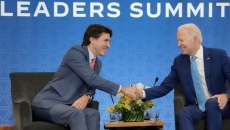VANCOUVER - The British Columbia government's outdated practice of granting mineral claims without Indigenous consent is a "continuation of the Crown's efforts the dismantle Gitxaala's society," a lawyer for the First Nation told a court.
Lisa Fong told the B.C. Supreme Court Monday the province hasfailed its constitutional duty to consult the nation before issuing mineral rights.
"This case is about whether Canadian law is ready to respect Gitxaala's self-governance and to acknowledge the negative impacts of B.C. automated mineral tenure registry on the fabric of Gitxaala's governance."
The court challenge, which includes Gitxaała and Ehattesaht First Nations, marks the first legal test since the B.C. government adopted the Declaration on the Rights of Indigenous Peoples Act.
The United Nations declaration was passed into law in B.C. in 2019 and requires governments to obtain free, prior and informed consent before taking actions that affect Indigenous Peoples and territories.
Jessica Clogg of West Coast Environmental Law, another lawyer representing Gitxaala, told a news conference that the court can and should declare the practice is inconsistent with the UN declaration.
"The reality is that the Mineral Tenure Act regime results in Indigenous Peoples being dispossessed of critical aspects of their title and rights to resources without any consultation or consent, which is clearly contrary to the articles of UNDRIP."
The current B.C. Mineral Tenure Act allows anyone with a free miner certificate to acquire mineral claims online through an automated system in First Nations’ territories, without their consultation or consent, the nation said in a news release.
The Gitxaala Nation, based on B.C.'s northern coast, filed a petition for judicial review in October 2021.
It is asking the court to quash seven mineral claims on Banks Island, south of Prince Rupert, and for the court to suspend claim staking in its territory. It also claims B.C.'s mineral grant regime doesn't allow the First Nation to use or develop the land.
Ehattesaht First Nation on Vancouver Island filed a similar judicial review challenging mineral claims in its territories in June last year.
The nations agreed that their two cases can be heard at the same time.
Fong told the court that consulting nations on mineral claims would not be a threat to the mining industry, but would require it to change.
"We say there's no evidence that shows mandatory consultation will reduce the viability of the mining industry. Evidence actually shows the opposite: that mining is compatible with consultation," she said.
Gitxaala Chief Councillor Linda Innes said the nation is "very hopeful" the B.C. Supreme Court will side with it following a two-week hearing in Vancouver.
"In their legal argument in our case, B.C. has the audacity to say that giving away mineral rights in our territory does not trigger the duty to consult. We disagree with that," she told the media on Monday.
“It is time for the B.C. government to walk the talk by putting an end to this practice of granting mineral rights without consultation or consent from Indigenous nations in British Columbia."
The BC Human Rights Commissioner, the First Nations Leadership Council, four First Nations, a group of non-profits and mineral exploration businesses will be intervening in the case, Gitxaała said in a news release.
Human rights commissioner Kasari Govender confirmed in a separate news release Monday that she will be in court this week.
She said how the declaration act is interpreted and implemented in this case will have "important implications for reconciliation in the province."
Govender said because the declaration is human rights legislation, it takes primacy over other statutes like the Mineral Tenure Act.
“This case is a test of what the declaration act means and how it applies to B.C. laws. We say the court must adopt the interpretation of the act that best upholds the human rights at issue: Indigenous Peoples’ collective human rights."





